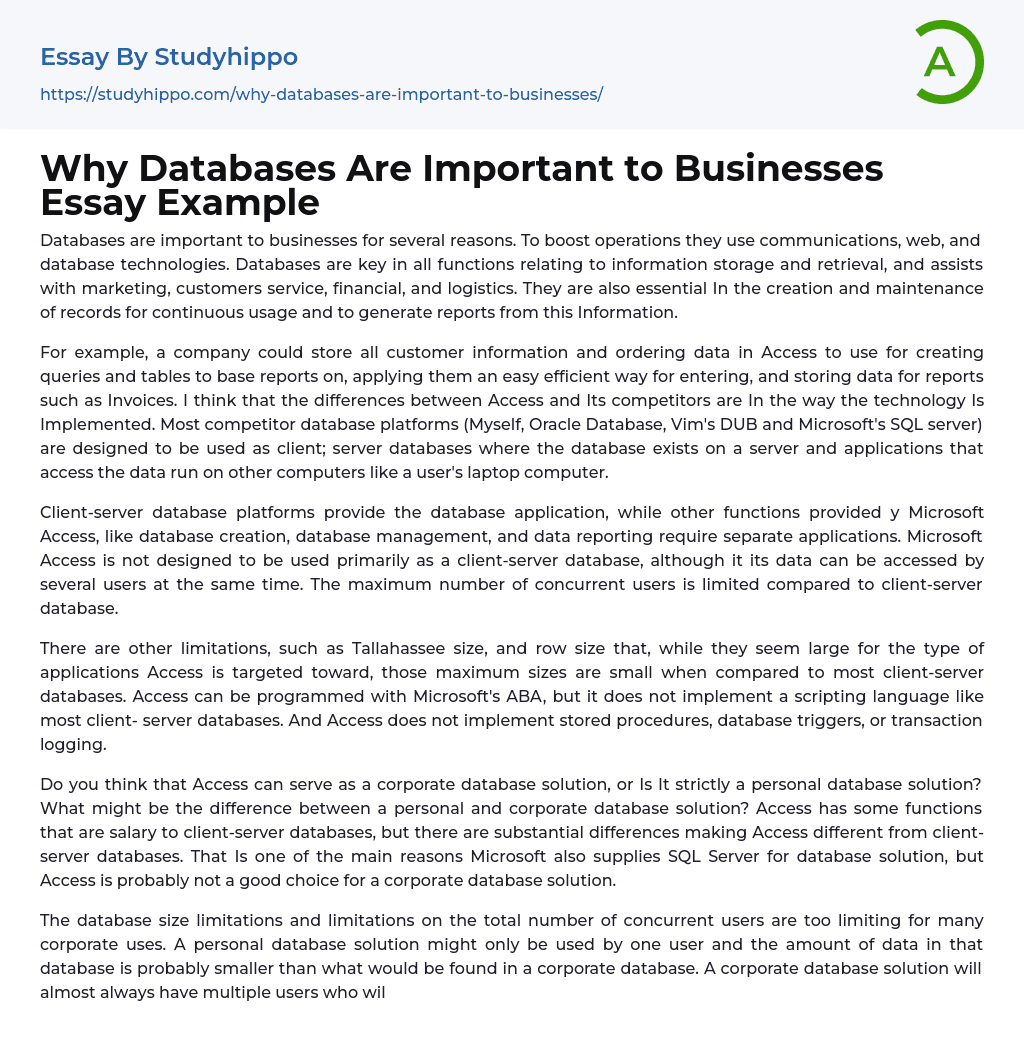Databases are important to businesses for several reasons. To boost operations they use communications, web, and database technologies. Databases are key in all functions relating to information storage and retrieval, and assists with marketing, customers service, financial, and logistics. They are also essential In the creation and maintenance of records for continuous usage and to generate reports from this Information.
For example, a company could store all customer information and ordering data in Access to use for creating queries and tables to base reports on, applying them an easy efficient way for entering, and storing data for reports such as Invoices. I think that the differences between Access and Its competitors are In the way the technology Is Implemented. Most competitor database platforms (Myself, Oracle Database, Vim's DUB and Microsoft's SQL server) are designed to be used as
...client; server databases where the database exists on a server and applications that access the data run on other computers like a user's laptop computer.
Client-server database platforms provide the database application, while other functions provided y Microsoft Access, like database creation, database management, and data reporting require separate applications. Microsoft Access is not designed to be used primarily as a client-server database, although it its data can be accessed by several users at the same time. The maximum number of concurrent users is limited compared to client-server database.
There are other limitations, such as Tallahassee size, and row size that, while they seem large for the type of applications Access is targeted toward, those maximum sizes are small when compared to most client-server databases. Access can be programmed with Microsoft's ABA, but it does no
implement a scripting language like most client- server databases. And Access does not implement stored procedures, database triggers, or transaction logging.
Do you think that Access can serve as a corporate database solution, or Is It strictly a personal database solution? What might be the difference between a personal and corporate database solution? Access has some functions that are salary to client-server databases, but there are substantial differences making Access different from client-server databases. That Is one of the main reasons Microsoft also supplies SQL Server for database solution, but Access is probably not a good choice for a corporate database solution.
The database size limitations and limitations on the total number of concurrent users are too limiting for many corporate uses. A personal database solution might only be used by one user and the amount of data in that database is probably smaller than what would be found in a corporate database. A corporate database solution will almost always have multiple users who will expect concurrent access. The corporate database will probably require a database administrator to create and manage the database, something a personal database would probably not require. . What is meant by requirements gathering, and why is it important to clearly define the data requirements of a database before creating it? Requirement gathering is a process that needs to be performed before making a project decision to execute a project or not. Experts gather a variety of different information on factors such as the scale of the user, the underlying features, securities, etc. In an attempt to understand the project completely and make possible cost estimations, time frames, and ultimately decide
to proceed with a project or not.
Decision making is based on the data requirement of a project, which makes it important to come up with an efficient database structure.
- Accounting essays
- Marketing essays
- Automation essays
- Business Cycle essays
- Business Model essays
- Business Operations essays
- Business Software essays
- Corporate Social Responsibility essays
- Infrastructure essays
- Logistics essays
- Manufacturing essays
- Multinational Corporation essays
- Richard Branson essays
- Small Business essays
- Cooperative essays
- Family Business essays
- Human Resource Management essays
- Sales essays
- Market essays
- Online Shopping essays
- Selling essays
- Strategy essays
- Management essays
- Franchising essays
- Quality Assurance essays
- Business Intelligence essays
- Corporation essays
- Stock essays
- Shopping Mall essays
- Harvard Business School essays
- Harvard university essays
- Trade Union essays
- Cooperation essays
- News Media essays
- Waste essays
- Andrew Carnegie essays
- Inventory essays
- Customer Relationship Management essays
- Structure essays
- Starting a Business essays
- Accounts Receivable essays
- Auditor's Report essays
- Balance Sheet essays
- Costs essays
- Financial Audit essays
- International Financial Reporting Standards essays
- Tax essays
- Accountability essays
- Cash essays
- Principal essays




